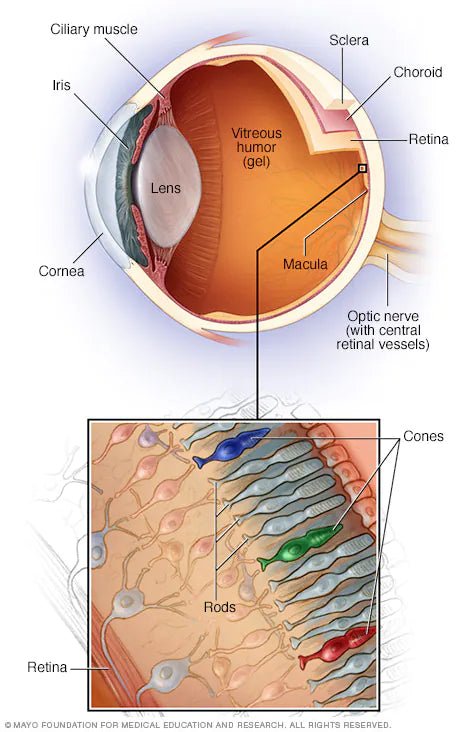
How to prevent Age-macular degeneration (AMD)
Share
How to prevent Age-macular degeneration (AMD)
What are the symptoms ?
Age-Related Macular Degeneration Symptoms
- Blurry or fuzzy vision.
- Difficulty recognizing familiar faces.
- Straight lines appear wavy.
- A dark, empty area or blind spot appears in the centre of vision.
- Loss of central vision, which is necessary for driving, reading, recognizing faces and performing close-up work.
As soon as you notice the presence of some of these symptoms, the ideal is to consult an ophthalmologist, not an optician. Only an ophthalmologist can give a diagnostic in the case of AMD.
Age-related macular degeneration (AMD) alters part of the retina. It causes a progressive decline in central vision, and affects people over 50 years old normally. If we cannot fight against ageing, it is possible to do change your lifestyle and diet in order to limit the risks' onset of AMD.
There are two forms of AMD in which the macula degenerates: the neovascular form, called exudative or “wet” the atrophic, or “advanced dry” form
How do you stop macular degeneration from progressing?
1) For the exudative or “wet” AMD:
Currently, most patients with “wet” AMD are treated with anti-vascular endothelial growth factor (anti-VEGF) medications. Injecting medication into the eye through the lens is used to treat the “wet” macular degeneration type.
2) For the “advanced dry” AMD:
For now, there's no way to reverse damage from “dry” macular degeneration. However, there are many clinical trials in progress.
If your condition is diagnosed early, you can take steps to help slow the progression of the AMD “wet” or “dry”, such as taking vitamin supplements, eating healthy and not smoking.
The general timeline for the progression of dry AMD from the initial diagnosis to significant vision loss is usually over several years, often within 10 years. However, with the right treatment, many AMD patients can reduce the risk of significant vision loss and preserve their vision for many years.
AMD is estimated to share 54.4% of visual impairment and 22.9% of blindness burden among Caucasian ethnicity in the United Kingdom. Late AMD causes blindness in nearly 11 million people globally in the word annually.
- We suggest for UK the Mediterranean type diet, favouring fruits and vegetables.
- Once a week: fatty fish (salmon, herring, sardines, mackerel, trout, bluefin tuna),
- At least twice a week: fresh, frozen, canned fish, think about pleasure seafood such as shellfish and crustaceans.
- Oils rich in omega 3. (can take vitamin supplement)
- Vary the oils (once a day 1 tablespoon of omega oil rapeseed, nuts, wheat germ), oleic oil in addition (olive oil, rapeseed).
- A small handful of nuts per day (walnuts, hazelnuts, almonds, pistachios without added salt).
- Vitamins and minerals: favour foods rich in vitamin C (strawberries, citrus fruits, kiwi, peppers, blueberries, etc.),
- vitamin E (vary the oils: wheat germ, sunflower, nuts, rapeseed, olive), dried fruits/fruits and vegetables, Selenium (seafood, mushrooms, onions, cooked legumes) and zinc (animal products).
- For macular pigments, they are found in egg yolk and cabbage (broccoli, among others).
- 500 gr Organic amaranth
- 1 kg of Purple plums or Blueberries that have been exposed to sunlight for 1/2 hour before using in the recipe;
-
2 teaspoons of olive oil
-
2 teaspoons of green chlorophyll (Can be found in a natural products store)
- 340 gr of Crunch tuna
- 250 gr of Kiwis
